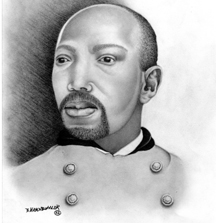The writer, within the past few years, and as early as seventeen years ago, then being quite young, and flushed with geographical and historical speculations, introduced in a Literary Institution of Young Men, the subject of Mexican, California, and South American emigration. [I] was always hooted at, and various objections raised: one on account of distance, and another that of climate.
[I have] since seen some of the same persons engage themselves to their White American oppressors, officers in the war against Mexico, exposing themselves to the changes of the heat of day and the damp of night, risking the danger of the battlefield, in the capacity of servants. And had the Americans taken Mexico, no people would have flocked there faster than the Colored people from the United States. The same is observed of California.
In conversation, in the city of New York, a few weeks ago, with a Colored lady of intelligence, one of the “first families,” the conversation being the elevation of the Colored people, [I] introduced emigration as a remedy, and Central America as the place. [I was] somewhat surprised, and certainly unprepared to receive the rebuking reply: “Do you suppose that I would go in the woods to live for the sake of freedom? No, indeed! If you wish to do so, go and do it. I am free enough here!,” remarking at the same time, that her husband was in San Francisco, and she was going to him as she learned that the city was quite a large and handsome place.
[I] reminded her that the industry of White men and women, in four years’ time had made San Francisco what it is. That in 1846, before the American emigration, the city contained about seven hundred people, surrounded by a dense wilderness; and that we regretted to contrast her conduct or disposition with that of the lady of Col. Fremont, a daughter of Senator Benton, who tenderly and indulgently raised, in the Spring after his arduous adventure across the mountains, and almost miraculous escape, while the county was yet a wilderness, left her comfortable home in Missouri, and braved the dangers of the ocean, to join her husband and settle in the wilderness. That she was going now to San Francisco, because it was a populous and “fine city” that Mrs. Fremont went, when it was a wilderness, to help to make a populous and fine city.
About two hours previous to the writing of the following fact, two respectable Colored ladies in conversation, pleasantly disputing about the superiority of the two places, Philadelphia and New York, when one spoke of the uniform cleanliness of the streets of Philadelphia and the dirtiness of those of New York; when the other triumphantly replied, “The reason that our streets are so dirty is that we do more business in one day, than you do in a month.”
In His Own Words: Martin Robison Delany
Praising the Past


The other acknowledged the fact with some degree of reluctance and explained with many “buts” as an excuse in extenuation. Here was a seeming appreciation of business and enterprise; but the query flashed through our mind in an instant, as to whether they thought for a moment of the fact that they had no interest in either city,nor its business. It brought forcibly to our mind, the scene of two of our oppressed brethren South, fighting each other, to prove his master the greatest gentleman of the two.
In a Literary Institution of Young Men, the subject of Mexican, California, and South American emigration. [I] was always hooted at, and various objections raised: one on account of distance, and another that of climate.
Around 1850, in the land of his Mandingo paternal and maternal grandparents, he entered a treaty with King Abbeokuta. The treaty secured the right of Africans in America to locate in the King’s unoccupied territory and share it with the locals. On the advice of an Anglican missionary, Reverend Henry Townsend, the king reneged his promise.
Though his most ambitious plan failed, Delany led a remarkable life. He published, “The Mystery.” On the paper’s mastheads, Delany chose the scripture, “And Moses was learned in all his wisdom of the Egyptians,” which is from Acts 7:22 in the “Bible,” to remind every one of the West’s dependence on African culture.
There is a historical marker in downtown Pittsburgh at Third and Market, where historians believe he published “The Mystery.” His spirit lives in “Port Of Harlem”, a magazine about Blacks at home and abroad.
In a Literary Institution of Young Men, the subject of Mexican, California, and South American emigration. [I] was always hooted at, and various objections raised: one on account of distance, and another that of climate.
Before Marcus Garvey . . . There Was Martin R. Delany
(1812-1885)
Around 1850, in the land of his Mandingo paternal and maternal grandparents, he entered a treaty with King Abbeokuta. The treaty secured the right of Africans in America to locate in the King’s unoccupied territory and share it with the locals. On the advice of an Anglican missionary, Reverend Henry Townsend, the king reneged his promise.
Though his most ambitious plan failed, Delany led a remarkable life. He published, “The Mystery.” On the paper’s mastheads, Delany chose the scripture, “And Moses was learned in all his wisdom of the Egyptians,” which is from Acts 7:22 in the “Bible,” to remind every one of the West’s dependence on African culture.
There is a historical marker in downtown Pittsburgh at Third and Market, where historians believe he published “The Mystery.” His spirit lives in “Port Of Harlem”, a magazine about Blacks at home and abroad.
Advertisers | Contact Us | Events | Links | Media Kit | Our Company | Payments Pier
Press Room | Print Cover Stories Archives | Electronic Issues and Talk Radio Archives | Writer's Guidelines




